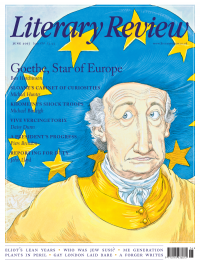Jane Ridley
Rex Whistler Painted Her Hall
A Constant Heart: The War Diaries of Maud Russell 1938–1945
By Emily Russell (ed)
The Dovecote Press 320pp £20
I don’t usually read books that I am sent to review in bed. But this one is the ideal bedtime book: slow-burning as diaries are, but richly absorbing, with the advantage that it doesn’t matter if one falls asleep after only ten minutes, as it can be picked up the next day.
Maud Russell was the daughter of a wealthy German Jewish stockbroker named Paul Nelke who came from Berlin to live in Britain in the 1880s. Born in London, Maud was brought up as an Englishwoman. She married Gilbert Russell, a banker sixteen years older than her, and they lived at a gem-like country house, Mottisfont Abbey in Hampshire. Maud usually wrote her diary on a Sunday morning, sitting in bed with cream or a beauty mask on her face.
When the diaries begin in 1938, Maud is forty-seven and Rex Whistler is working on a set of murals for the hall at Mottisfont. She finds Rex maddeningly unreliable but brilliant, and marvels as the ideas ‘drip’ from the pencil that he clutches, strangely, between his second and third fingers.

Sign Up to our newsletter
Receive free articles, highlights from the archive, news, details of prizes, and much more.@Lit_Review
Follow Literary Review on Twitter
Twitter Feed
Though Jean-Michel Basquiat was a sensation in his lifetime, it was thirty years after his death that one of his pieces fetched a record price of $110.5 million.
Stephen Smith explores the artist's starry afterlife.
Stephen Smith - Paint Fast, Die Young
Stephen Smith: Paint Fast, Die Young - Jean-Michel Basquiat: The Making of an Icon by Doug Woodham
literaryreview.co.uk
15th-century news transmission was a slow business, reliant on horses and ships. As the centuries passed, though, mass newspapers and faster transport sped things up.
John Adamson examines how this evolution changed Europe.
John Adamson - Hold the Front Page
John Adamson: Hold the Front Page - The Great Exchange: Making the News in Early Modern Europe by Joad Raymond Wren
literaryreview.co.uk
"Every page of "Killing the Dead" bursts with fresh insights and deliciously gory details. And, like all the best vampires, it’ll come back to haunt you long after you think you’re done."
✍️My review of John Blair's new book for @Lit_Review
Alexander Lee - Dead Men Walking
Alexander Lee: Dead Men Walking - Killing the Dead: Vampire Epidemics from Mesopotamia to the New World by John Blair
literaryreview.co.uk